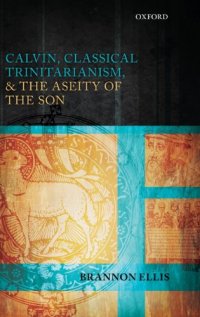
Ebook: Calvin, Classical Trinitarianism, and the Aseity of the Son
Author: Brannon Ellis
- Tags: General Religious World History Reference Almanacs Yearbooks Atlases Maps Careers Catalogs Directories Consumer Guides Dictionaries Thesauruses Encyclopedias Subject English as a Second Language Etiquette Foreign Study Genealogy Quotations Survival Emergency Preparedness Test Preparation Words Grammar Writing Research Publishing Studies Religion Spirituality Theology Christian Hinduism Islam Judaism Humanities New Used Rental Textbooks Specialty Boutique
- Year: 2012
- Publisher: Oxford University Press
- Edition: 1
- Language: English
- pdf
For much of his career as a Reformer John Calvin was involved in trinitarian controversy. Not only did these controversies span his career, but his opponents ranged across the spectrum of theological approaches-from staunch traditionalists to radical antitrinitarians. Remarkably, the heart of Calvin's argument, and the heart of others' criticism, remained the same throughout: Calvin claimed that the only-begotten Son of the Father is also, as the one true God, 'of himself'.
Brannon Ellis investigates the various Reformation and post-Reformation responses to Calvin's affirmation of the Son's aseity (or essential self-existence), a significant episode in the history of theology that is often ignored or misunderstood. Calvin neither rejected eternal generation, nor merely toed the line of classical exposition. As such, these debates turned on the crucial pivot between simple unity and ordered plurality-the relationship between the processions and consubstantiality-at the heart of the doctrine of the Trinity. Ellis's aim is to explain the historical significance and explore the theological implications of Calvin's complex solidarity with the classical tradition in his approach to thinking and speaking of the Triune God. He contends that Calvin's approach, rather than an alternative to classical trinitarianism, is actually more consistent with this tradition's fundamental commitments regarding the ineffable generation of God from God than its own received exposition.
Brannon Ellis investigates the various Reformation and post-Reformation responses to Calvin's affirmation of the Son's aseity (or essential self-existence), a significant episode in the history of theology that is often ignored or misunderstood. Calvin neither rejected eternal generation, nor merely toed the line of classical exposition. As such, these debates turned on the crucial pivot between simple unity and ordered plurality-the relationship between the processions and consubstantiality-at the heart of the doctrine of the Trinity. Ellis's aim is to explain the historical significance and explore the theological implications of Calvin's complex solidarity with the classical tradition in his approach to thinking and speaking of the Triune God. He contends that Calvin's approach, rather than an alternative to classical trinitarianism, is actually more consistent with this tradition's fundamental commitments regarding the ineffable generation of God from God than its own received exposition.
Download the book Calvin, Classical Trinitarianism, and the Aseity of the Son for free or read online
Continue reading on any device:

Last viewed books
Related books
{related-news}
Comments (0)